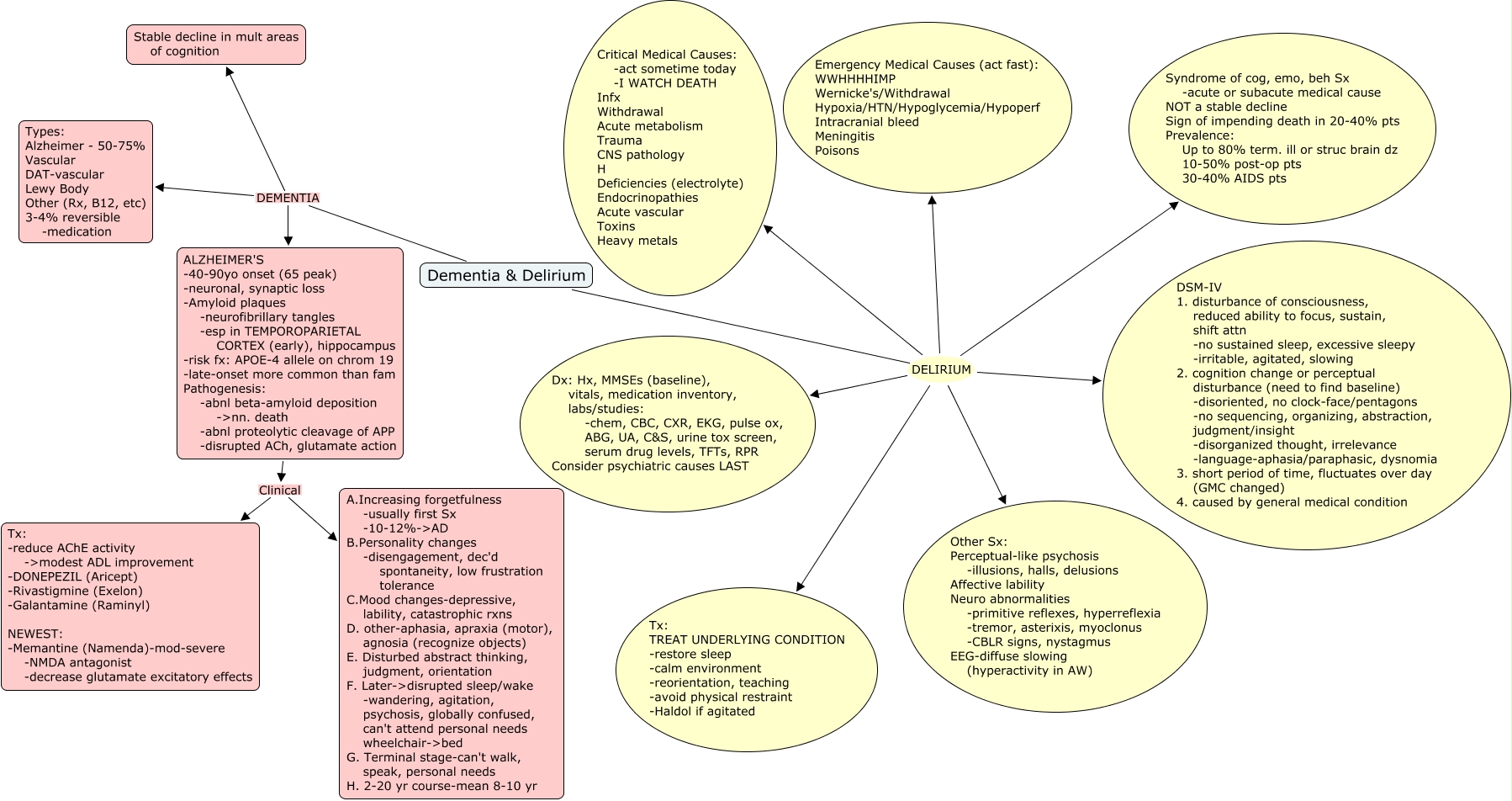Understanding The Connection Between Metabolic Syndrome And Dementia Onset

Table of Contents
The Shared Risk Factors of Metabolic Syndrome and Dementia
Metabolic syndrome and dementia share several overlapping risk factors, highlighting a strong interconnectedness between these seemingly disparate conditions. These shared vulnerabilities contribute to the increased likelihood of developing dementia in individuals with metabolic syndrome.
-
Inflammation: Chronic, low-grade inflammation is a hallmark of metabolic syndrome. This persistent inflammatory state damages blood vessels and contributes to insulin resistance. Importantly, chronic inflammation is also implicated in the neurodegenerative processes underlying Alzheimer's disease and other forms of dementia. Studies have shown a correlation between elevated inflammatory markers (like C-reactive protein) and an increased risk of cognitive decline.
-
Insulin Resistance: Insulin resistance, a key feature of metabolic syndrome, impairs the body's ability to effectively use insulin to regulate blood sugar. This resistance extends to the brain, disrupting glucose metabolism and potentially contributing to neuronal dysfunction and the development of Alzheimer's disease. Research suggests that insulin resistance may accelerate the accumulation of amyloid-beta plaques, a hallmark of Alzheimer's.
-
Vascular Disease: Metabolic syndrome significantly elevates the risk of cardiovascular disease, including stroke and atherosclerosis. These cardiovascular events can directly damage brain tissue, leading to vascular dementia, a type of dementia caused by reduced blood flow to the brain. Hypertension, a common component of metabolic syndrome, further exacerbates this risk.
-
Oxidative Stress: Both metabolic syndrome and dementia are associated with increased oxidative stress—an imbalance between the production of free radicals and the body's ability to counteract them. This oxidative damage affects cellular function and contributes to both vascular damage and neuronal degeneration, accelerating cognitive decline. Antioxidants are believed to play a role in mitigating this damage.
The correlation between these shared risk factors and the prevalence of both metabolic syndrome and dementia is substantial. For example, studies published in the Journal of the American Medical Association (JAMA) have consistently shown a strong association between metabolic syndrome and an increased incidence of dementia. Further research by the National Institutes of Health (NIH) continues to reinforce this link.
Mechanisms Linking Metabolic Syndrome to Dementia
The shared risk factors described above are not merely coincidental; they reflect underlying biological mechanisms that directly link metabolic syndrome to an increased risk of dementia.
-
Amyloid-beta Plaques: Insulin resistance, prevalent in metabolic syndrome, appears to interfere with the clearance of amyloid-beta plaques from the brain. These plaques, a characteristic feature of Alzheimer's disease, contribute to neuronal dysfunction and cognitive impairment. The impaired insulin signaling pathway may directly contribute to amyloid-beta accumulation.
-
Neurovascular Damage: Hypertension and atherosclerosis, common consequences of metabolic syndrome, directly impact cerebral blood flow. Reduced blood flow deprives brain cells of oxygen and nutrients, leading to neuronal damage and potentially contributing to vascular dementia. The damage to blood vessels can also lead to microbleeds in the brain, further compromising cognitive function.
-
Neuroinflammation: Chronic inflammation, stemming from metabolic syndrome, fuels neuroinflammation in the brain. This neuroinflammation contributes to neuronal damage, synaptic dysfunction, and ultimately, cognitive impairment. The inflammatory response triggered by metabolic dysfunction can accelerate the neurodegenerative processes seen in dementia.
Numerous scientific studies published in journals such as Neurology and Brain support these mechanisms, offering a strong biological basis for the observed link between metabolic syndrome and dementia.
Identifying and Managing Metabolic Syndrome to Reduce Dementia Risk
Fortunately, managing metabolic syndrome can significantly reduce the risk of developing dementia. Early identification and proactive intervention are key.
-
Lifestyle Modifications: Lifestyle changes are fundamental to managing metabolic syndrome and reducing dementia risk. These include:
- Diet: Adopting a heart-healthy diet, such as the Mediterranean diet, rich in fruits, vegetables, whole grains, and healthy fats, can significantly improve insulin sensitivity and reduce inflammation.
- Regular Exercise: Regular physical activity improves insulin sensitivity, lowers blood pressure, and helps with weight management – all crucial factors in managing metabolic syndrome.
- Weight Management: Losing even a moderate amount of weight can dramatically improve insulin sensitivity and reduce the risk of cardiovascular disease.
- Stress Reduction: Chronic stress exacerbates inflammation and can negatively impact cardiovascular health. Stress management techniques, such as yoga or meditation, can be beneficial.
-
Medication: Under the guidance of a physician, medication can play a vital role in managing metabolic syndrome. Medications to control blood pressure, cholesterol levels, and blood sugar are often prescribed to help reduce the risks associated with the condition.
-
Regular Health Checkups: Regular screenings for metabolic syndrome and its risk factors, including blood pressure, cholesterol, and blood sugar levels, are essential for early detection and intervention. Early diagnosis allows for timely management and a greater chance of mitigating the risk of dementia.
Early intervention is crucial. By proactively addressing metabolic syndrome, individuals can significantly reduce their risk of developing dementia.
Conclusion
The evidence overwhelmingly supports a strong link between metabolic syndrome and an increased risk of dementia. The shared risk factors, the underlying biological mechanisms, and the effectiveness of managing metabolic syndrome all underscore this connection. By understanding this relationship and taking proactive steps to manage metabolic syndrome through lifestyle changes and medical intervention, individuals can significantly reduce their risk of developing dementia.
Take control of your health and reduce your risk of dementia by understanding and managing metabolic syndrome. Schedule a checkup with your doctor today!

Featured Posts
-
 Protecting Your Makeup Childproof Storage Ideas For Teens
Apr 25, 2025
Protecting Your Makeup Childproof Storage Ideas For Teens
Apr 25, 2025 -
 Boeing Ceo No More Jets For China Unless Airlines Accept Deliveries
Apr 25, 2025
Boeing Ceo No More Jets For China Unless Airlines Accept Deliveries
Apr 25, 2025 -
 The Impact Of Foreign Funding Restrictions Harvard And The Future Of Higher Education
Apr 25, 2025
The Impact Of Foreign Funding Restrictions Harvard And The Future Of Higher Education
Apr 25, 2025 -
 Is Apple Tv S Next Crime Thriller Its Masterpiece A Look At The Genres Ascent On The Platform
Apr 25, 2025
Is Apple Tv S Next Crime Thriller Its Masterpiece A Look At The Genres Ascent On The Platform
Apr 25, 2025 -
 Brian Tyree Henry And Wagner Moura Steal The Show In Dope Thief Trailer
Apr 25, 2025
Brian Tyree Henry And Wagner Moura Steal The Show In Dope Thief Trailer
Apr 25, 2025
